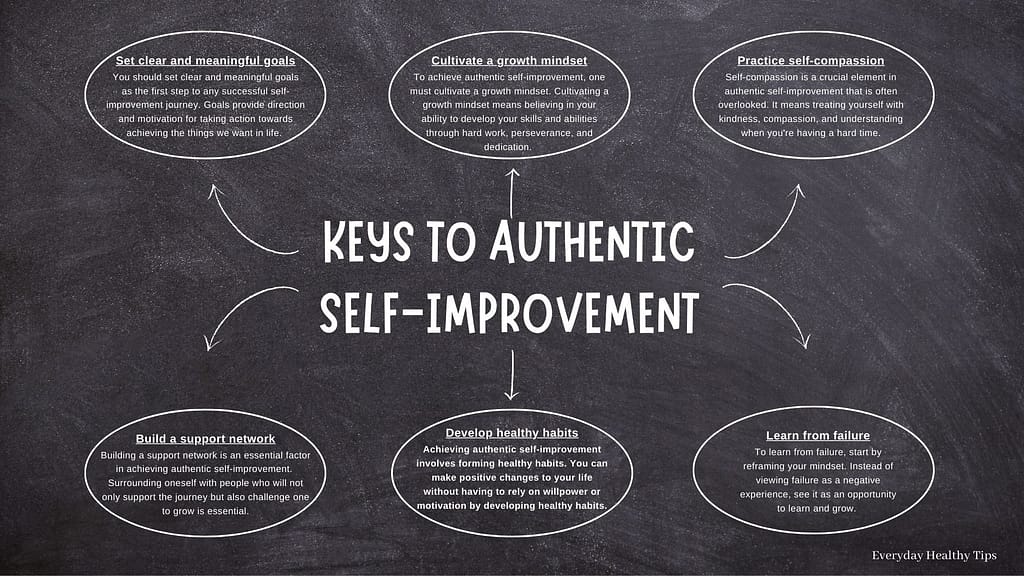It’s simple to feel like we don’t measure up in a world where models of perfect lives are all around us. We compare ourselves to others and feel like we are not achieving enough or living up to our potential. It’s important to remember that everyone has their own unique journey, and there is no one-size-fits-all approach to self-improvement.
Self-help advice, motivational quotes, and success stories can be helpful, but we must remember to take them with a grain of salt.
What works for one person may not work for another. It’s imperative to find what resonates with us individually and adapt it to our own lives.
In this journey of self-improvement, we need to understand that it’s not a competition with anyone else, but a competition with ourselves.
We need to focus on our own progress and not compare ourselves with others. Everyone has their own journey to take, and it’s important to recognise that what works for someone else may not work for us.
In this post, we will explore the keys to authentic self-improvement and how you can master your mind to become the best version of yourself.
Set clear and meaningful goals
You should set clear and meaningful goals as the first step to any successful self-improvement journey. Goals provide direction and motivation for taking action towards achieving the things we want in life. However, not all goals are equal in value.
To ensure that your goals are authentic and meaningful, you should ask yourself what is truly important to you. Determine what you want to achieve in life and why it is important to you. Then, break your goals down into specific and measurable steps to make it easier to track and stay motivated.
To set clear and meaningful goals, you need to take into account your strengths, weaknesses, opportunities, and threats, as well as external factors.
You should base your goals on a realistic assessment of your skills and resources, and make sure they are challenging yet achievable. Prioritise your goals and create a plan of action that outlines the steps needed to achieve them.
By doing this, you can stay focused and motivated, ultimately achieving the success you desire.
Cultivate a growth mindset
To achieve authentic self-improvement, one must cultivate a growth mindset. Cultivating a growth mindset means believing in your ability to develop your skills and abilities through hard work, perseverance, and dedication.
A growth mindset sees challenges and obstacles as opportunities to learn and grow, rather than as threats to your self-worth. Overcoming self-doubt and achieving your goals requires this mindset.
Start by focusing on your strengths rather than weaknesses to cultivate a growth mindset. Recognize that you can learn and improve, and that setbacks are a natural part of the learning process.
Don’t let obstacles hinder your growth; instead, use them as stepping stones towards success. Every challenge you face is a chance to gain new knowledge and enhance your skills. Instead of getting discouraged when you face obstacles, use them as opportunities to learn and grow.
Practice self-compassion
Self-compassion is a crucial element in authentic self-improvement that is often overlooked. It means treating yourself with kindness, compassion, and understanding when you’re having a hard time.
Practicing self-compassion can make you stronger and better equipped to handle difficult situations. Self-compassion helps promote positivity and nurture inner dialogue.
It’s not just about accepting one’s flaws and imperfections. It’s also about recognizing that everyone makes mistakes and experiences setbacks.
Many people mistakenly believe that self-criticism is necessary for self-improvement. However, research has shown that self-compassion is a much more effective approach.
When you practice self-compassion, you are more likely to bounce back from setbacks and stay motivated to achieve your goals.

Build a support network
Building a support network is an essential factor in achieving authentic self-improvement. Seeking to change oneself can be a daunting task, but having a network of supportive individuals can make it less daunting.
Surrounding oneself with people who will not only support the journey but also challenge one to grow is essential. A support network can consist of individuals who share similar goals, mentors, coaches, and peers who offer guidance, encouragement, and feedback.
The support network should provide accountability, as well as a safe space to share fears, failures, and successes. With a support network in place, one can achieve greater self-awareness, resilience, and ultimately, the transformational change they desire.
When building your support network, you should choose people who are positive, supportive, and non-judgmental. Surround yourself with people who will uplift you and help you stay motivated, rather than people who will bring you down or discourage you. Remember that you can ask for help or support from your support network whenever you need it.
Develop healthy habits
Achieving authentic self-improvement involves forming healthy habits. You can make positive changes to your life without having to rely on willpower or motivation by developing healthy habits. Healthy habits include things like exercising regularly, eating a balanced diet, getting enough sleep, and practicing self-care.
When developing healthy habits, start small and focus on one habit at a time. Make sure your habit is specific, measurable, and achievable.
For example, instead of saying you want to exercise more, set a goal to go for a 30-minute walk every day. Once you have established one healthy habit, you can build on it by adding another one.
Learn from failure
Finally, one of the most important keys is to learn from failure. You cannot improve without making mistakes because failure is a natural part of the learning process.
However, many people view failure as a sign of weakness or incompetence, which can prevent them from taking risks and pursuing their goals.
To learn from failure, start by reframing your mindset. Instead of viewing failure as a negative experience, see it as an opportunity to learn and grow. Reflect on what went wrong, and identify what you can do differently next time. Remember that failure is not the end of the journey – it is simply a detour on the road to success.
Bottomline
Genuine self-improvement can only be achieved through mental mastery. You become your best self by deliberate goal planning, creating a growth mindset, practising self-compassion, surrounding yourself with positive people, establishing healthy routines, and growing from your mistakes.
However, if you put in the effort and adopt the right mindset, you can succeed


